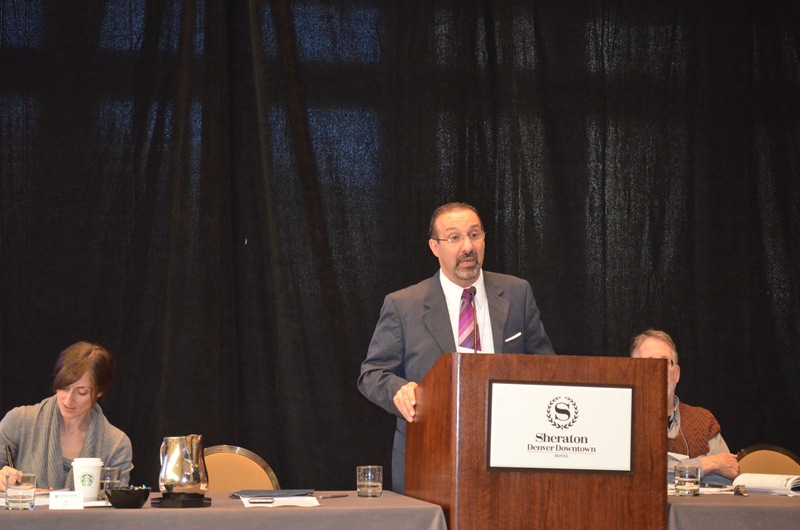Cirs Travels to the Mesa Conference in Denver, Co

The Center for International and Regional Studies participated in the 2012 annual Middle East Studies Association (MESA) Conference held in Denver, Colorado, November 17 – 20, 2012. In addition to having a booth for CIRS publications at the book bazaar, Mehran Kamrava (Director of CIRS) and Zahra Babar (Assistant Director for Research at CIRS) presented papers at MESA panel discussions.
Mehran Kamrava presented his paper on “State Building and Political Consolidation in Qatar” in the “Political Economy in the Gulf” panel, chaired by Joe Stork from Human Rights Watch. During his presentation, Kamrava outlined the history of the Al-Thani family’s rise to power, in which they faced limited political competition from other groups. Although the flow of oil revenues further consolidated the Al-Thani rule, the ruling family suffered from internal competition over state resources and emerging state institutions. This lack of unity within the family persisted until the mid-1990s, when following a palace coup, Hamad Bin Khalifa the current ruler of Qatar, focused on the consolidation of the Qatari state and put a stop to intra-family fighting. This preoccupation with political consolidation however, led to a delayed focus on state-building processes. In an effort to develop the institutions needed for modern governance, state function over the last decade has multiplied both directly and indirectly with the creation of a multitude of bureaucracies and semi-governmental entities. As part of the national consolidation project, social actors were brought in as stakeholders to these institutions, thereby bringing them closer to the ruling family’s orbit. In what remains a highly personalistic regime, Hamad Bin Khalifa expanded the Qatari state by bringing cohesion to the ruling family and establishing institutional dynamics that allow for built-in ties between the Qatari state and various social actors.
In the “Migration and (Non)Citizenship in Gulf States: Policies, Practices, and Negotiations” panel, chaired by Gwenn Okruhlik, Zahra Babar presented her paper on “Inclusion/Exclusion: Citizens and Migrants in the State of Qatar”. During her presentation, Babar argued that Qatar’s stringent citizenship regulations are intertwined with the country’s migration patterns. The large inflow of migrants has created a society where the Qatari nationals constitute a mere 15% of the population, the remainder of which includes foreign temporary migrants and long-term skilled migrants. Citizenship in Qatar is largely defined by the range of social and economic welfare benefits accrued to its citizenry. The high cost of citizenship, along with the presence of a large migrant population has heightened the state’s interest in guarding citizenship. However, due to their moral claim to citizenship, the presence of long-term skilled migrants has placed legitimate pressure on the state to open up its citizenship regulations. By creating naturalization clauses within its citizenship legislation, the state created a pressure valve whereby it formalized the pathway to citizenship. As a result, a tiered structure of citizenship has been created, reflective of the pressures from migrants to create a more inclusive framework of citizenship and from Qatari nationals in keeping the pie of state largesse exclusive. As there are no signs of Qatar’s dependency on foreign labor abating in the near future, the Qatari state will face increased pressures to reframe its citizenship structure. In the interest of sustainability, the state may be forced to decrease the socio-economic benefits delivered to its citizenry or to create a new social contract that is based on a tiered citizenship structure with naturalized citizens acting as second class citizens.
CIRS also participated in the MESA book exhibit, where its latest publications were available to conference participants.